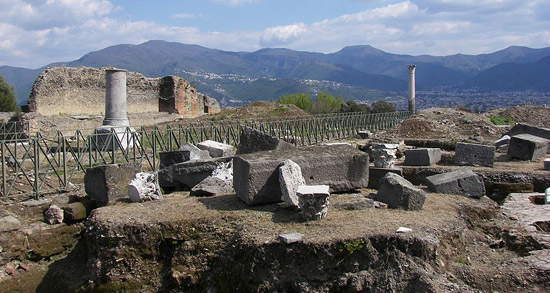In the past few hours, about theunion assembly that resulted in a partial closure of the Pompeii excavations this Friday, we have heard anything and everything. It is a pity that the media have only given relevance to the statements of the various politicians who have stigmatized the assembly called by the unions. Franceschini spoke of"incalculable damage," while Renzi launched into a frontal attack against the unions branding the Pompeii assembly as “simply scandalous.” Moreover, calling it a “surprise assembly,” when in fact it had been announced well in advance: some newspapers, as early as July 16, reported the unions’ intentions to call assemblies on Friday, July 24 and Saturday, July 25 (the one on Saturday, July 25 would later be brought forward to Thursday, July 23 so as not to interfere with Roberto Bolle ’s performance at the Pompeii Amphitheater).
The vast majority of politicians (and commentators) were certainly quick to point the finger at unions and workers guilty, in their view, of blocking the archaeological site and causing, using Franceschini’s words, “incalculable damage” to tourism and Italy’s image. It should be pointed out, meanwhile, that the assemblies lasted only two hours: during the rest of the day, tourists were able to continue visiting Pompeii undisturbed. However, the press aligned with the positions of the government preferred to gloss over this detail of no small importance, because it would have givendimensions of the real inconvenience caused to the tourists. An inconvenience that lasted little more than an hour, also because Superintendent Massimo Osanna anticipated the reopening by throwing open the gates in person. And again: the right to organize union assemblies, even during working hours (up to a maximum of ten hours per year for which wages are guaranteed), is established by the Workers’ Statute, in particular Article 20. Union assemblies are part of the normal working life of a company: union assemblies are called almost everywhere, often even in many museums scattered all over Italy but, who knows why, it is exclusively those in Pompeii that make the news (and those last weekend, moreover, were the only ones in 2015). Above all, however, there is a fundamental point to be made: workers have no fewer rights than tourists.
 |
| The Temple of Venus in Pompeii. Photo credit - Creative Commons |
Few, in fact, have had the good sense to ask what motives led unions to call assemblies in the middle of the tourist season. Providing some clarity was an article on the Brescia CISL website, which starts from an assumption: many media care little about workers’ reasons. And political forces care even less about those reasons, which ride the protests “to feed the qualunquism they need to assert themselves.” But if we look at it from the workers’ point of view we will discover that, as the press release issued by the Brescia CISL reveals, “every year, for 15 years now, the employees of the Ministry of Cultural Heritage and Activities and Tourism have been guaranteeing through productivity agreements the enjoyment of cultural heritage for the benefit of citizens and tourists from all over the world, for 11 hours a day and 362 days a year. The increase in the number of days and hours that cultural sites are open has produced and produces on a daily basis an exponential increase in the flow of visitors with a related increase in revenue to the state coffers.”
The workers’ guarantee of an efficient and constantly active service (recall that Pompeii’s excavations close only three days a year: January 1, May 1 and December 25), however, is often not adequately compensated for by certain salary disbursements, stable hiring, well-paid overtime, and so on. A representative of theBase Union of Trade Unions, Domenico Blasi, told L’Espresso that MiBACT employees in Pompeii have not received their fringe salaries (production bonuses) since November. Also under indictment would be the gradual privatization that Pompeii is undergoing. A privatization that, according to the unions, would lead to"precarious, underpaid work and a lack of employment prospects for young people": according to Tommaso Flauto of the Union of Basic Trade Unions, the private companies that are entrusted with assignments through conventions would tend, in order to earn more money, to enter into contracts of very short duration, with no protections for workers, and with low salaries. Against this backdrop is the reason why the assemblies were called: the definition of the organizational profile of the janitors of the excavations, so that risks due to staff shortages (another of the problems affecting the excavations) can be avoided in the future.
Could the Pompeii workers have called the union assembly outside working hours and without causing harm to tourists? Probably yes, because while it is true that a union action, in order to gain attention, should involve even the slightest inconvenience, it is also true that this time it backfired on the workers, and given previous experiences, including at other museums and sites, it cannot be said that the unions could not have imagined this. But it is also necessary to emphasize the fact that we have witnessed resounding levels of instrumentalization, and everything but the workers’ message against delayed payments, precariousness and privatization has come through. So there is every reason to speak of yet another attack by the government (and the media that supports it) on workers’ rights. An attack, moreover, that is boorish, pitting workers’ reasons against the very frustrated rhetoric of beauty in a mean-spirited way, as if workers were the only ones to blame for the failure of tourists to enjoy our heritage. When, in fact, the real culprits of inefficiencies, ineffectiveness and malfunctions are precisely those who move (worse and worse, it really has to be said) the strings of the machine. And the workers are injured parties, just like the tourists. In fact, they are the party receiving the most harm.

The author of this article: Federico Giannini
Nato a Massa nel 1986, si è laureato nel 2010 in Informatica Umanistica all’Università di Pisa. Nel 2009 ha iniziato a lavorare nel settore della comunicazione su web, con particolare riferimento alla comunicazione per i beni culturali. Nel 2017 ha fondato con Ilaria Baratta la rivista Finestre sull’Arte. Dalla fondazione è direttore responsabile della rivista. Nel 2025 ha scritto il libro Vero, Falso, Fake. Credenze, errori e falsità nel mondo dell'arte (Giunti editore). Collabora e ha collaborato con diverse riviste, tra cui Art e Dossier e Left, e per la televisione è stato autore del documentario Le mani dell’arte (Rai 5) ed è stato tra i presentatori del programma Dorian – L’arte non invecchia (Rai 5). Al suo attivo anche docenze in materia di giornalismo culturale all'Università di Genova e all'Ordine dei Giornalisti, inoltre partecipa regolarmente come relatore e moderatore su temi di arte e cultura a numerosi convegni (tra gli altri: Lu.Bec. Lucca Beni Culturali, Ro.Me Exhibition, Con-Vivere Festival, TTG Travel Experience).
Warning: the translation into English of the original Italian article was created using automatic tools. We undertake to review all articles, but we do not guarantee the total absence of inaccuracies in the translation due to the program. You can find the original by clicking on the ITA button. If you find any mistake,please contact us.